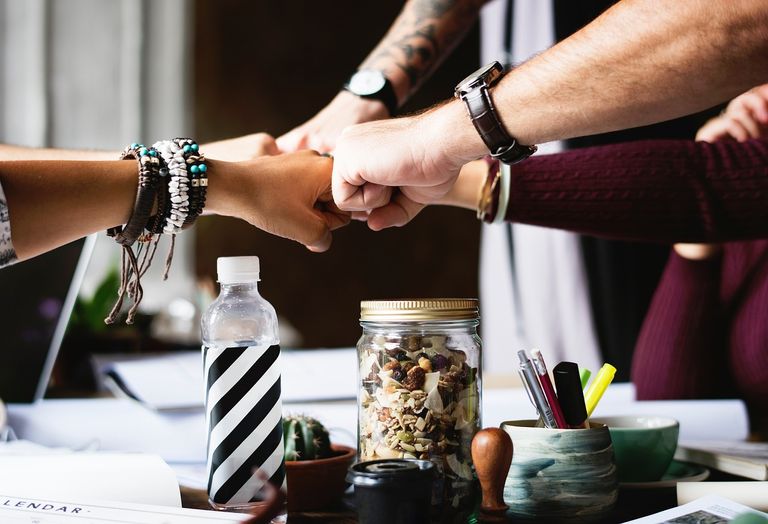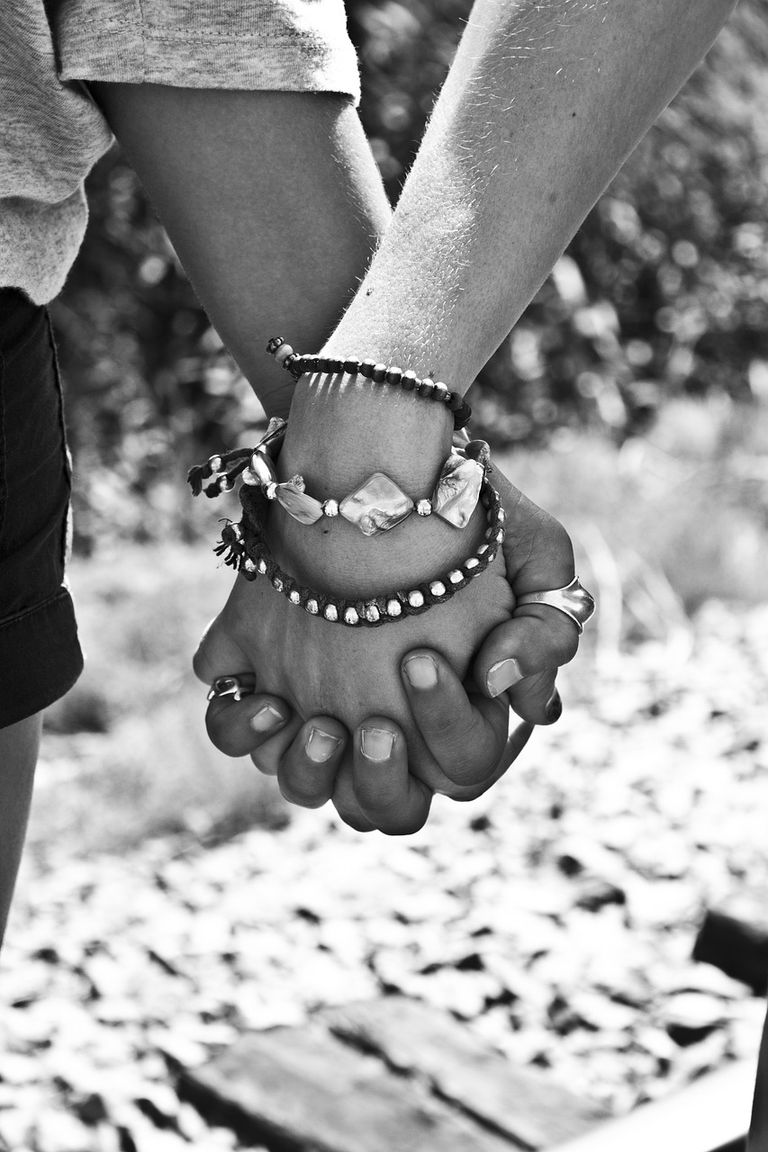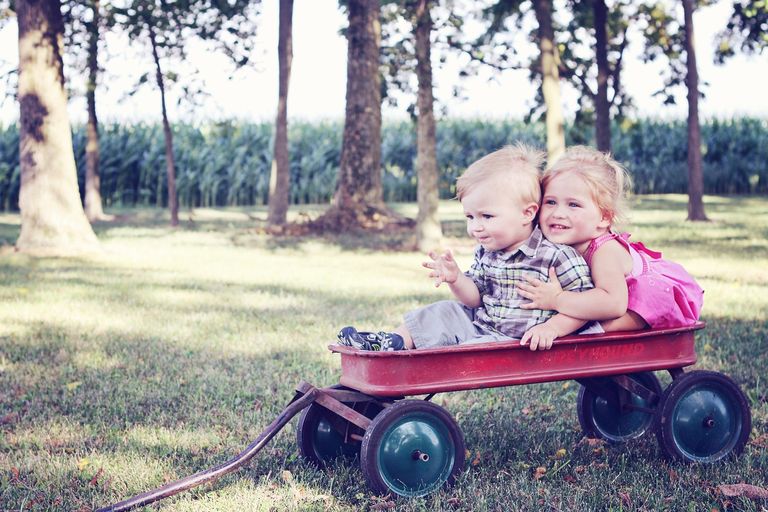Peer pressure
Peer pressure refers to the influence exerted by one's peers or social group to conform to certain behaviors, attitudes, or actions. It is a common phenomenon that can occur in various settings, such as schools, workplaces, or social circles. Peer pressure can be both positive and negative, depending on the context and the behavior being influenced.

source
Positive peer pressure can encourage individuals to engage in activities that are beneficial or constructive. For example, peers might encourage each other to participate in sports, study together for exams, or pursue healthy hobbies. In these cases, peer pressure can have a positive impact on personal growth, motivation, and the development of healthy habits.
On the other hand, negative peer pressure can lead individuals to engage in behaviors that are harmful or undesirable. Examples include experimenting with drugs or alcohol, engaging in risky activities, or engaging in bullying or aggressive behavior. Negative peer pressure can be particularly influential during adolescence when individuals are more susceptible to the opinions and actions of their peers.
It's important to note that not everyone succumbs to peer pressure in the same way. Some individuals may be more susceptible to external influences, while others may be more independent and assertive in their decision-making. The ability to resist negative peer pressure and make independent choices is often linked to factors such as self-confidence, self-esteem, and a strong sense of personal values.
If you find yourself facing peer pressure, it can be helpful to:
Understand your own values: Knowing your own beliefs and values can help you make decisions that align with your principles, even if others are pressuring you to do otherwise.
Surround yourself with positive influences: Seek out friends and mentors who support your goals and encourage healthy behaviors. Being part of a positive social circle can help counteract negative peer pressure.
Practice assertiveness: Learn to assert your own opinions and preferences without feeling the need to conform to others' expectations. Being confident in your choices can make it easier to resist negative influences.
Seek support: If you're facing particularly challenging peer pressure situations, don't hesitate to reach out to trusted adults, such as parents, teachers, or counselors, for guidance and support.

source
Remember, it's okay to say "no" if something doesn't align with your values or makes you uncomfortable. Making independent choices based on your own judgment is an important part of personal growth and development.
Who are your peers???
When someone asks, "Who are your peers?" they are referring to individuals who are similar to you in terms of age, background, social status, or interests. Peers are typically individuals who belong to the same social group or share common characteristics or experiences. They can include classmates, colleagues, friends, or individuals within the same community or profession.
Peers often play a significant role in shaping one's attitudes, behaviors, and beliefs. They can have a direct influence on personal choices, such as fashion preferences, hobbies, or recreational activities. Additionally, peers can provide emotional support, understanding, and a sense of belonging.
The concept of peers is often more prominent during adolescence, as individuals at this stage are more likely to seek validation from their peers and conform to their group's norms and expectations. However, the influence of peers can extend to other stages of life as well.
Identifying your peers involves recognizing individuals who share common interests, goals, or experiences with you. They are the people you interact with on a regular basis and consider part of your social circle. Peers can have both positive and negative influences on your life, so it's important to choose your peers wisely and surround yourself with individuals who support and encourage your personal growth and well-being.
Types of peer groups
Peer groups can vary based on various factors, including the context in which they form, the common interests or characteristics of their members, and the purpose they serve. Here are some common types of peer groups:

source
School-based peer groups: These groups consist of classmates or students who share the same educational environment. They can form based on factors like grade level, academic programs, extracurricular activities, or shared interests within the school setting.
Friendship groups: Friendship groups are based on personal connections and shared interests or hobbies. These peers are often individuals who spend time together outside of formal settings like school or work and provide social support and companionship.
Work-based peer groups: Work-based peer groups form among colleagues or coworkers within a professional setting. They may involve individuals from the same department, team, or organization. Work-based peer groups can provide support, collaboration, and networking opportunities.
Support groups: Support groups bring together individuals who are dealing with similar challenges or circumstances. These can include groups for individuals with specific health conditions, addiction recovery groups, or therapy groups. Support groups provide a space for sharing experiences, offering guidance, and providing emotional support.
Online communities: With the rise of social media and online platforms, peer groups can also form virtually. Online communities based on shared interests, hobbies, or identities bring people together from diverse geographic locations. These groups can provide support, information sharing, and opportunities for collaboration or discussion.
Cultural or identity-based peer groups: Cultural or identity-based peer groups involve individuals who share a common cultural background, ethnicity, religion, or other aspects of identity. These groups can provide a sense of belonging, understanding, and support for members who share similar experiences and challenges.
Individuals can belong to multiple peer groups simultaneously and that the boundaries between these groups can be fluid. Different peer groups can have different dynamics, influences, and purposes in an individual's life. The influence of peer groups can vary depending on the level of interaction, shared values, and the individual's personal choices and resilience in the face of peer pressure.
Some things we can learn from our peers?
We can learn a variety of things from our peers. Here are some examples:

source
Knowledge and information: Peers can share knowledge and information about various subjects. They may have different perspectives, experiences, or expertise in different areas. Engaging in conversations and discussions with peers can broaden our understanding and provide new insights and information.
Skills and abilities: Peers can possess skills or abilities that we may want to acquire or improve upon. They can serve as role models and mentors, offering guidance and support as we learn and develop new skills.
Social and communication skills: Interacting with peers allows us to observe and learn social and communication skills. We can learn how to engage in conversations, actively listen, express ourselves effectively, and navigate different social situations.
Problem-solving and decision-making: Peer groups often involve collaborative problem-solving. Through group discussions and exchanges of ideas, we can learn different approaches to addressing challenges, evaluating options, and making decisions.
Cultural awareness and diversity: Interacting with peers from diverse backgrounds and cultures can foster cultural awareness and sensitivity. Learning about different perspectives, traditions, and customs can broaden our understanding of the world and promote empathy and inclusivity.
Personal growth and self-reflection: Peer relationships can provide valuable feedback and opportunities for self-reflection. Constructive criticism, support, and encouragement from peers can contribute to personal growth and help us identify areas for improvement.
Resilience and coping strategies: Peers can share experiences and strategies for overcoming obstacles, dealing with stress, and building resilience. Learning from their experiences can help us develop our own coping mechanisms and navigate challenging situations.
Interests and hobbies: Peers often introduce us to new interests, hobbies, or activities that we may not have discovered otherwise. Sharing common interests with peers can lead to new experiences and expand our horizons.

Source
It's important to approach learning from peers with an open mind, actively engaging in conversations and being receptive to different perspectives. By valuing the knowledge and experiences of our peers, we can foster a continuous learning process and benefit from the diverse perspectives and expertise within our social circles.
Why are peers so so important?
Peers are important for several reasons:
Socialization and belonging: Peers play a crucial role in socialization, particularly during childhood and adolescence. They provide opportunities for social interaction, friendship, and a sense of belonging. Being part of a peer group helps individuals develop social skills, learn societal norms, and form their own identities.
Emotional support: Peers can offer emotional support, understanding, and empathy. They are often going through similar life experiences and can provide a safe space for sharing feelings, concerns, and challenges. Having supportive peers can contribute to overall emotional well-being and provide a network of individuals who can offer comfort during difficult times.
Influence and learning: Peers have a significant influence on each other's attitudes, beliefs, behaviors, and choices. They can introduce new ideas, perspectives, and experiences, expanding one's horizons and facilitating personal growth. Peer influence can be both positive, encouraging pro-social behaviors and healthy habits, and negative, pressuring individuals into engaging in risky or harmful behaviors.
Validation and self-esteem: Peers provide validation and feedback, which can contribute to an individual's self-esteem and self-worth. Being accepted and valued by peers helps develop a positive self-image and confidence in one's abilities and identity.
Development of social skills: Interacting with peers allows individuals to develop and refine their social skills, such as communication, cooperation, negotiation, and conflict resolution. Peer interactions provide opportunities to practice these skills in real-life situations and learn from successes and challenges.
Learning from diverse perspectives: Peers come from various backgrounds, cultures, and experiences. Engaging with a diverse group of peers exposes individuals to different perspectives, ideas, and ways of thinking. This exposure promotes open-mindedness, cultural awareness, and the ability to see the world from different viewpoints.
Motivation and goal setting: Peers can serve as a source of motivation and inspiration. Seeing peers succeed in certain areas can encourage individuals to set goals, strive for personal growth, and work towards their aspirations. Peer support and competition can drive individuals to achieve more than they would on their own.

source
While peers are influential and significant, the role of parents, teachers, and other supportive adults in an individual's life remains crucial. A healthy balance of peer influence and guidance from trusted adults helps individuals navigate the complexities of social relationships and make informed decisions.
Peers of bad influences
While peers can have positive influences, it's also important to acknowledge that some peers can be negative or have detrimental influences on individuals. Here are some considerations regarding peers who may be bad influences:
Risky behaviors: Peers who engage in risky behaviors such as substance abuse, vandalism, or criminal activities can exert pressure on individuals to participate in these activities. Associating with peers involved in such behaviors increases the likelihood of individuals engaging in them as well.
Negative attitudes and values: Peers who exhibit negative attitudes, such as hostility, prejudice, or lack of empathy, can influence others to adopt similar views. Being surrounded by peers who promote negative values can shape an individual's belief system and behavior in undesirable ways.
Academic performance: Peers who prioritize academic disengagement or have a lack of motivation may influence others to adopt similar attitudes towards education. This can negatively impact an individual's academic performance and future prospects.
Peer pressure: Peer pressure, whether positive or negative, can be influential. Peers who engage in negative behaviors may pressure others to conform, making it challenging for individuals to make independent choices aligned with their values.
Emotional well-being: Negative peer relationships, such as bullying or exclusion, can have detrimental effects on an individual's emotional well-being. Constant exposure to negativity, criticism, or toxic relationships can lead to decreased self-esteem, anxiety, and depression.
Legal consequences: Associating with peers involved in illegal activities can expose individuals to legal consequences. Being associated with a peer group engaged in criminal behavior increases the likelihood of individuals getting involved in illegal activities themselves.
It's crucial for individuals to recognize the potential negative influences of their peers and take steps to mitigate them. This includes:

source
- Developing a strong sense of personal values and boundaries.
- Surrounding oneself with positive influences and seeking out supportive and healthy peer relationships.
- Building assertiveness skills to resist negative peer pressure and make independent choices.
- Seeking guidance and support from trusted adults, such as parents, teachers, or counselors, to navigate challenging peer situations.
Being aware of the potential negative influences of peers and actively choosing positive peer relationships can help individuals make informed decisions and steer clear of harmful behaviors.
How to avoid bad peers?
Avoiding bad peers can be a proactive approach to protect yourself from negative influences. Here are some strategies to help you avoid bad peers:

source
Define your values and priorities: Clarify your personal values, goals, and aspirations. When you have a clear understanding of what is important to you, it becomes easier to identify peers who align with those values and avoid those who don't.
Choose your social circles wisely: Surround yourself with positive, supportive, and like-minded individuals. Seek out friends and peer groups who share similar interests, values, and goals. Engage in activities, clubs, or organizations where you are more likely to find peers with whom you can build healthy and constructive relationships.
Trust your instincts: Pay attention to your intuition when it comes to assessing potential peers. If something feels off or you have reservations about someone's behavior or values, it may be a sign that they are not the right fit for you. Trusting your instincts can help you avoid getting entangled with bad peers.
Be selective with your friendships: Quality matters more than quantity when it comes to friendships. Focus on building a few close and meaningful friendships rather than trying to fit in with a large group. Develop relationships based on mutual respect, trust, and shared values.
Set boundaries: Establish clear personal boundaries and communicate them assertively. Let others know what behaviors or influences you are not comfortable with, and be prepared to distance yourself from individuals who consistently cross those boundaries.
Seek positive role models and mentors: Look for individuals who can serve as positive role models or mentors. These individuals can offer guidance, support, and advice as you navigate peer relationships. Having positive influences in your life can help steer you away from bad peers.
Develop your self-esteem and confidence: Building your self-esteem and confidence can make you less susceptible to negative peer influences. When you have a strong sense of self-worth, you are more likely to make independent choices and resist peer pressure that goes against your values.
Seek support from trusted adults: If you find yourself in a situation where you are surrounded by bad peers or facing negative influences, reach out to trusted adults such as parents, teachers, or counselors. They can provide guidance, support, and help you navigate challenging social dynamics.

source
Remember, avoiding bad peers is about consciously choosing positive influences and taking responsibility for the relationships you cultivate. By surrounding yourself with supportive and like-minded individuals, you can create a positive social environment that contributes to your personal growth and well-being.